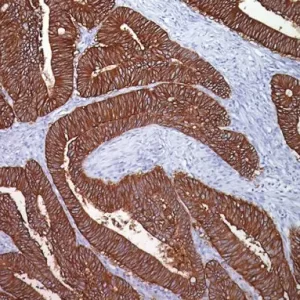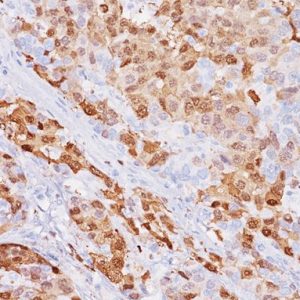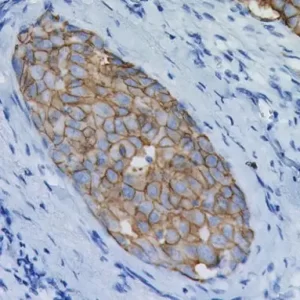Description
PTEN antibody, a novel tumor suppressor, functions as a regulator of both cell cycle progression and apoptosis. Potentially, mutation and deletion of PTEN gene may result in a new signal transduction pathway related to human malignant tumors. Studies have demonstrated a reduction of PTEN expression in advanced breast, prostate and other cancers. In addition, studies also suggest that patients with ErbB2 overexpressing tumors and concurrent low levels of PTEN expression have a poor response to trastuzumab treatment.
SPECIFICATIONS
Specifications
| INTENDED USE | IVD |
|---|---|
| SOURCE | Mouse Monoclonal |
| CLONE | 6H2.1 |
| ISOTYPE | IgG |
| ANTIGEN | PTEN |
| LOCALIZATION | Cytoplasmic |
| POSITIVE CONTROL | Some breast, renal cell and prostate carcinomas |
| SPECIES REACTIVITY | Human, Mouse |
DATASHEETS & SDS
| Download Data Sheet |
| Download RUO Data Sheet for International |
| SDS Sheet |
Regulatory Notice: Biocare’s IVD-labeled products comply with US-FDA and European IVDD regulation. Other regions may have additional requirements for such labeling, please contact your local distributor.
REFERENCES
1. Bose S, et al. Reduced expression of PTEN correlates with breast cancer progression. Hum Pathol. 2002 Apr; 33(4):405-9. 2. Bose S, et al. The Akt pathway in human breast cancer: a tissue-array-based analysis. Mod Pathol. 2006 Feb;19(2):238-45. 3. Center for Disease Control Manual. Guide: Safety Management, NO. CDC-22, Atlanta, GA. April 30, 1976 “Decontamination of Laboratory Sink Drains to Remove Azide Salts.” 4. Clinical and Laboratory Standards Institute (CLSI). Protection of Laboratory workers from occupationally Acquired Infections; Approved guideline-Third Edition CLSI document M29-A3 Wayne, PA 2005.







Reviews
There are no reviews yet.